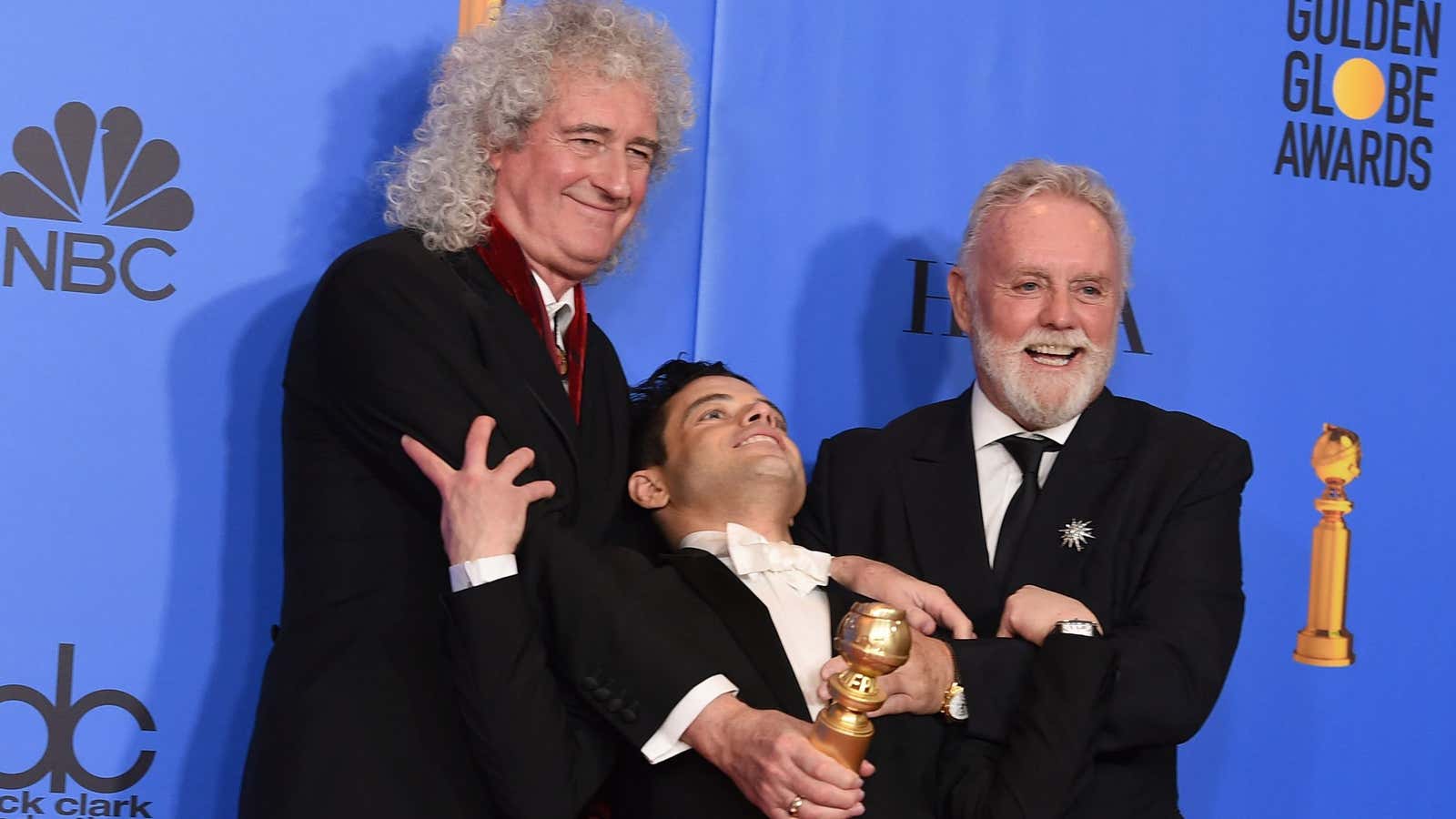If you watched the Golden Globe Awards, you saw a very different picture from what the past year in film was really like. The Oscars on Feb. 24 may not be much better.
Black Panther—a critical hit, cultural phenomenon, and box office sensation—was shut out of the Globes entirely. Bradley Cooper’s widely loved musical romance, A Star Is Born, didn’t win any major awards either. (It did, however, win best original song for Lady Gaga’s “Shallow.”) Roma, one of the most critically acclaimed films of 2018, deservedly won best foreign language film—but that’s because it wasn’t even eligible for the primary best picture category. Spike Lee’s scintillating BlacKkKlansman didn’t win anything. The Favourite and If Beale Street Could Talk took home one acting prize apiece, but that’s all. And don’t even bother looking for indie critical darling First Reformed anywhere. No way was the Hollywood Foreign Press Association going to nominate that.
Instead, the night’s big winners were Queen biopic Bohemian Rhapsody and race-relations period dramedy Green Book, winning for best drama and best comedy film, respectively. Bohemian Rhapsody also netted Rami Malek an award for his portrayal of frontman Freddie Mercury, while Green Book won awards for its screenplay and for actor Mahershala Ali.
Despite a sturdy $700 million global box office total, Bohemian Rhapsody has not been a hit with critics, earning only 62% on Rotten Tomatoes amid criticism that its trite biopic structure does a disservice to Mercury’s legacy. And given the history of sexual misconduct claims against director Bryan Singer (who was fired in the middle of production), showering Bohemian Rhapsody with accolades is tone-deaf at best, sinister at worst.
Green Book‘s big night is perhaps just as dubious because it can’t boast nearly the same box-office take to bolster its credentials. (It made $35 million in the US and is just beginning to trickle out to theaters internationally.) The film presents the road-trip story of the brilliant black pianist Don Shirley and his Italian-American nightclub-bouncer-turned-chauffeur Tony Vallelonga (Viggo Mortensen). Green Book received mostly positive reviews when it debuted at film festivals last year but has since received scrutiny for its well-meaning but ultimately reductive—and arguably harmful—depiction of race. It doesn’t help that Shirley’s family condemned the film, claimed it was full of lies, and said they were never even consulted for the story.
That these two films have emerged as Oscars frontrunners in a year with so many other impressive (and far less problematic) options is a disappointing victory for middle-of-the-road mediocrity. There is a growing disconnect between what critics consider to be “good” films and what awards voters can coalesce around. Oscar nominations aren’t announced until Jan. 22, but a best-picture category that includes Green Book, Bohemian Rhapsody, Vice, and Mary Poppins Returns would be one of the worst in recent memory— and highly unrepresentative of the year in film as a whole.
While the Globes and the Oscars have very different voting blocs (the Globes are voted on by a group of 90 Los Angeles-based international entertainment journalists; the Academy of Motion Picture Arts and Sciences, which votes on the Oscars, is comprised of more than 8,000 film-industry pros), the success of Green Book and Bohemian Rhapsody may portend more success in February.
The Academy’s preferential voting system tends to reward films with broad support—even if that support is mostly lukewarm—over films with small but passionate backings. Both Green Book and Bohemian Rhapsody are the sort of unexceptional, seemingly innocuous films with just enough critical clout to make best-picture nominations likely and a victory for one of them conceivable.
Already the two films have shot up the rankings on betting sites and awards predictors. Green Book and Bohemian Rhapsody are now two of the top four odds-on favorites for best picture, along with Roma, which could have trouble convincing old-school Academy voters to vote for a Netflix film, and A Star Is Born, which was expected to do well at the Globes but mostly bombed.
As some pundits have already pointed out, the Globes wins for Green Book and Bohemian Rhapsody could, ironically, bring more attention to the films’ issues, and thus lessen their chances of striking gold a second time at the Oscars. That’s essentially what happened last year to Three Billboards Outside Ebbing, Missouri (though it still won two of its seven Oscar nominations, both for acting).
We’ll know more once the Academy’s various branches (directors, producers, editors, actors, etc.) start handing out their own awards over the next month. But the Globes painted a pretty bleak picture for people hoping the Oscars might actually reflect the ingenuity and risk-taking that made 2018 such a memorable year in film.
